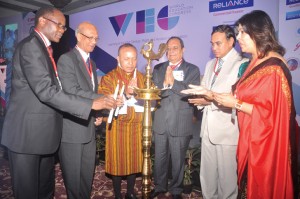 The World Education Congress 2012 brought together Representatives from the World of Education to Discuss Different Aspects of Academics. Youth Inc Tells You More about this Highly Informative Event.
The World Education Congress 2012 brought together Representatives from the World of Education to Discuss Different Aspects of Academics. Youth Inc Tells You More about this Highly Informative Event.
When great minds come together, the outcome is almost always brilliant. With the World Education Congress too, the result was without a doubt highly outstanding. Participants from all over the world attended the two-day conference that was hosted at hotel Taj Lands End, Mumbai in June 2012. The World Education Congress, an initiative of Dr Bhatia, aims to bring together global leaders in education and academics to discuss evolving trends in education. The congress also examines modern as well as traditional knowledge systems adopted by different countries of the world.
Other than this, the conference offered unique and in-depth approaches to understanding vital academic issues that affect an institution’s viability in today’s fast-paced business environment.
The theme of the conference this year was ‘Learning in the 21st Century: Right and Access to Education’. Those in attendance included education ministers, scholars, vice chancellors, academicians, professors, corporate leaders and other representatives from 88 countries.
A good number of distinguished personalities from across the world were invited to speak about a host of education-related issues over the course of the two days. Dr David Richard Namwandi, (Ministry of Education, Republic of Namibia), Nurul Islam Nahid, (Minister of Education, Bangladesh) Porncha Mongkhonvanit, (President SIAM University) and Dr Ranjan Saxena (Vice Chancellor, NMIMS University) were among the many prominent speakers who enlightened the audience with their insights on various education-related topics. Lyonpo Thakur S Powdyel, the wellspoken education minister of Bhutan, who has himself been an educator for nearly three decades, explained the philosophy behind Bhutan’s Gross National Happiness (GNH) and the importance of education, keeping in mind the development of Bhutan through the state’s unique mode of economic measure. He went on to inform those in attendance that the ‘Educating for Gross national Happiness’ programme was initiated in 2009. He is of the opinion that GNH is a more genuine measure over Gross Domestic Product (GDP).
He said that he strongly feels that education will go a long way in engaging Bhutan as a whole. Thus, as a team, Bhutan will be able to take education to a higher level and keep up with the visions of leaders and the aspirations of the people. An interesting point that was brought to light by the education minister, was Bhutan’s goal to nurture green schools. According to him, with so many environmental changes, humanity needs to find a way out of this mess.
Jayanti Ghose, an education counsellor with more than two decades of experience in the field, shared her observations and fears about the changing trends in educational choices. She said that with a wide range of study and career options, students are often confused and stressed about making the right decision. The need of the hour, according to her, is for students to understand that there can be more than one right decision. She believes that Indian schools do not impart a ‘career education’ as due emphasis is not given to the development of skills, knowledge and attitude. Her suggestion was for educational institutes to help students understand themselves instead of blindly matching students to an occupation.
Pornchai Mongkhonvanit, (President SIAM University), made a relevant point about how the shelflife of knowledge has shortened considerably in present times. He revealed how the knowledge that a student obtains in the first year of his education, is obsolete by the time he graduates in the third year. Therefore, the aim of education, challenging as it might be, is to not only provide students with one particular job, or the ability to get a job, but to equip them for the entire duration of their careers.
In addition to the sessions by educational leaders, networking opportunities were abound during the two days at the lunch and tea breaks and at a specially hosted cocktails and dinner session organised for the attendees.
The educational dignitaries, academicians and scholars were also presented with awards at special celebratory functions over the course of the two days. The World Education Congress Global Awards, recognised the best representatives in the field of education with the aim of benchmarking educational practices.
Teeming with insights, ideas and information, the World Education Congress is a significant step towards the development of education.
The theme of the conference this year was ‘Learning in the 21st Century: Right and Access to Education’. Those in attendance included education ministers, scholars, academicians and other representatives from 88 countries
Volume 2 Issue 2



































